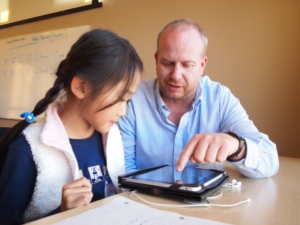Teens and Social Media: Three Big Issues
Every generation, new issues arise to challenge the new sets of parents. In today’s time, one such problem that almost all parents readily lament relates to teens and social media.
Yesterday Versus Today
Despite the existence of technology in the ‘80s, ‘90s, and early 2000s, the use of it in those decades was seemingly more controllable than it is now. Teenagers back then still had access to gaming platforms such as Atari, Gameboy, Nintendo, Playstation, and a variety of PC games. They also had movies, TV, cable, and videos to pass the time.
 But in those times, it was quite clear that such devices were generally for entertainment purposes. It was easier then for both parents and children to understand that when studying or doing other daily tasks, such devices had to be turned off or left at home.
But in those times, it was quite clear that such devices were generally for entertainment purposes. It was easier then for both parents and children to understand that when studying or doing other daily tasks, such devices had to be turned off or left at home.
Today, however, social media is acknowledged as more than just a source of entertainment. Almost everyone knows that it is an important way to instantly and cheaply communicate with family, classmates, teachers, and friends.
Social media also keeps people abreast of important current events, both locally and internationally, that may have a direct effect on their lives (e.g. sudden storms, road closures, or crimes). Moreover, it is used as a means of learning, which is why many students insist that they “need” their gadgets at school; and why many parents also gift their young children, some as young as two years-old, with access to social media via tablets or smart phones.
Teens and Social Media: Three Big Issues
While it is imperative for parents to ensure that their younger children do not become too attached to social media, the more pressing problem is the effect on their teens. Parents have begun to notice that something is not right with teen use of this technological tool.
The following are some major issues that teenagers face because of social media.
The Problem of Depression
There is growing evidence that social media may be linked to depression. Recent studies have discovered that higher rates of reported depression are found in people who spend much time on social media than those who do not use it so much. Though not fully conclusive, since much research must still be done, it should cause concerned parties to pause and consider the possible correlation.
Although social media is a means to update family and friends about one’s life, what is shown is not always the “reality” as people opt to present their best selves publicly. If not in an angsty mood, most teens prefer to only show the “best” of what is happening in their life, displaying their best smiles, best clothes, and best experiences. Sadly, for unguided teens, especially those with inferiority issues, they compare their situation against others and find that much is lacking in their life, bringing them down.
Moreover, cyberbullying is another problem that may lead to teenage depression. As a means of public humiliation, some bullies post comments, pictures, or videos meant to put others down. Since such posts can rapidly spread within minutes, a humiliating post – true or not – can quickly and greatly damage a teenager’s reputation as classmates, teachers, and family members can easily view it. To make matters worse, these other people may then add their own snide remarks or personal judgments without first consulting the person involved.
And because fake accounts can easily be created, more and more bullies take advantage of this, making life horrible for many teens. It is no wonder why many believe that teenage suicide is on the rise because of social media.
The Problem of Anxiety
Anxiety due to social media is another issue that researchers are seriously looking into. Similar to depression, recent studies are showing a correlation between anxiety and social media usage.
 For lots of teens, their social media accounts have become their virtual “hangout” where they keep in touch with others, even if they are at home. Teens can easily spend hours on their various accounts as they scroll through their friends’ and family members’ accounts, communicate with others, and update their own social media pages. And this is where the anxiety comes in.
For lots of teens, their social media accounts have become their virtual “hangout” where they keep in touch with others, even if they are at home. Teens can easily spend hours on their various accounts as they scroll through their friends’ and family members’ accounts, communicate with others, and update their own social media pages. And this is where the anxiety comes in.
Many teens admit that simply uploading their activities is not enough. They need to be perfect, lest they receive negative comments or they do not receive enough “likes.” So they are pressured to come up with the best caption, best angle, and best edit for their post.
In fact, some teens are always planning where to go for their next Instagrammable photo or video shoot. While parents may find all of this unnecessary and a big waste of time and resources, for teens it is an essential part of adolescent life.
However, though their social media accounts have been perfected for the day, there is still that additional pressure to live up to what they have posted. Looking pretty, smart, sociable, or bubbly online is nothing if they cannot back it up in the flesh and this can be particularly difficult if what has been posted isn’t exactly who they truly are in real life.
Additionally, there is the burden of staying relevant. Though they may be able to capture the attention of the desired audience at the moment, their accounts need to be maintained as their peers are also doing the same.
So if one classmate heads to a tropical beach for a weekend of picturesque fun, chances are that the teen will devise a way to do so as well. It is a sad game of comparison that can really take a toll on an emotionally vulnerable teen, more so if they were really not that “cool” and “interesting” to begin with.
The Problem of Communication
The final issue is that of communication. It is ironic that in this era of faster and cheaper modes of communication that the youngsters are losing the ability to truly communicate. Although parents take note of their children’s constant communication via their gadgets, the reality is that teens are slowly losing the skill to speak directly and properly to their family, teachers, and even their own peers.
In the not-so-distant past, it was usual for most teenagers to be out of the house, meeting their friends to mingle. And if they opted to use the phone, they actually talked to one another. Though not all parents then appreciated this need for teens to always be together, they were at least learning true communication skills.

Nowadays, much of the teens’ communication is done through texting, messaging, or posts. Though they get to practice their writing skills and even artistic skills to a certain extent, the ability to communicate directly has been affected even if they are trying to talk over the phone.
Many have difficulty sustaining a discussion, explaining themselves, making requests, or resolving issues. They also have problems picking up on social cues such as body language, vocal reactions, and facial expressions because they are not used to doing so. Because of this, many complain that teens are socially awkward or that they come off as very demanding or rude, especially when speaking to older persons.
Now while some may think this is not that important in this age of technology, one day these teens will be joining the workforce where they will need such skills to move up in the world. They will also become the next set of parents so they need to be able to communicate well if they wish to have a healthy, loving family.
What Parents Can Do
Though many teens have already fallen for the allure of social media, it is not too late for parents to step in and do something to break its grip on their children’s lives.
Model Good Gadget Behavior
A big reason why social media use seems to be out of control is that parents themselves use it so much as well. During so-called family time, both parents and teens are scrolling through their phones and tablets. If parents want to curb their children’s usage, the whole family must be willing to place limits on their use of gadgets.
A good way to do this is to impose a no-gadget-usage rule at certain times for ALL members to follow. Initially, this could be for Sunday lunch and dinner, designating such times as strictly family time. During these times, parents and children will have the opportunity to truly communicate with one another.
Once established, this new rule may then be extended to special holidays, and eventually to all meal times. In this way, teens may be slowly weaned away from always looking at their social media accounts.
Check In on Them Regularly
While it can be tempting for busy parents to let their teens be, especially if they are not visibly causing any harm, it is important for parents to set aside some time to get to know their teens better. Despite a strong childhood foundation, there are so many sources out there that may be influencing a teen, so parents need to find out how emotionally and mentally stable their teenagers really are.
Although this can be done at meal times, some teens may need extra attention away from the rest of the family. A walk at the park and going for coffee or snacks at the mall are just some of the many activities that can be done together where the teens may be able to open up to their parents.
Parents need to be aware of their teenagers’ dreams, fears, and problems so that they can be given reassurance and helpful advice. In this way, anxiety can be reduced and depression may be prevented.
Teach Them Mindfulness
Becoming more mindful about their situation can help teens reduce stress so that they can return to reality and reduce the impact of negative emotions brought about by social media.
 When being mindful, the brain is trained to become aware of the things happening around them – sounds of water or animal life, the feel of the ground under their feet, the smell of their immediate environment, or the beauty of their world seen through open eyes. In this way, they may then be able to pull their minds out of the virtual world they may be in and reassess what is “real.” This is particularly helpful if they find their minds stuck on negative thoughts about a recent post or comment on social media.
When being mindful, the brain is trained to become aware of the things happening around them – sounds of water or animal life, the feel of the ground under their feet, the smell of their immediate environment, or the beauty of their world seen through open eyes. In this way, they may then be able to pull their minds out of the virtual world they may be in and reassess what is “real.” This is particularly helpful if they find their minds stuck on negative thoughts about a recent post or comment on social media.
Becoming more mindful may also allow them to slowly withdraw from the grip of social media as they begin to realize that reality is what is around them in the here and now, not what is being said in the virtual world where people wear masks to hide their true selves.
Christian Counseling for Teens
I praise you because I am fearfully and wonderfully made; your works are wonderful, I know that full well. – Psalm 139:14
Adolescence is a time of excitement and discovery as well as adjustment and failure. Thankfully, there is much that parents can do to help their teens battle the social media issue. Time, patience, love, and care are needed for them to reach out to their teens.
However, every family situation is different. Despite positive actions to reduce social media usage, some parents may find that social media’s damage to their child is too great. The teens may already be hopelessly addicted to it or they may be suffering from severe anxiety or depression. In such situations, it is necessary to seek professional help before things spiral out of control.
In Christian counseling for teens, the latest therapeutic methods will be used to address the teen’s emotional or mental issues. In a safe, neutral environment, chances are that the teen will be able to truly open up about what they are going through, something they might not be able to do with their parents or other family members.
But most importantly, the teen will be introduced to God’s love and mercy through a strong relationship with our Lord and Savior, Jesus Christ. Those who have serious issues because of social media have probably based their own self-worth on the opinions of others, which is not correct.
Our self-worth should come from our being children of God as we are made in His image and likeness and are saved through the blood of His Son. In Christian counseling, the teen will get to know Christ more deeply through prayer and meditation on Holy Scripture so that they may be aware of these truths, allowing them to truly heal and break social media’s hold on their life.
If you are having difficulty prying your teenager away from social media’s negative influence, seek help soon. It is only by connecting to God that they will learn how to truly connect to themselves and others.
“Social Media”, Courtesy of Adrianna Calvo, Pexels.com, CC0 License; “Broken,” courtesy of Matt Gruber, CreationSwap.com, CC0 License; “Student”, Courtesy of Brad Flickinger, Flickr.com, CC BY 2.0 License; “Mindfulness”, Courtesy of Lesly Juarez, Unsplash.com, CC0 License




